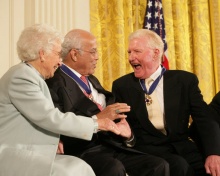Difference between revisions of "Paul Johnson"
(t) |
(Added: employment.) |
||
| Line 14: | Line 14: | ||
|religion=Roman Catholic | |religion=Roman Catholic | ||
|children=Daniel Johnson, Luke Johnson | |children=Daniel Johnson, Luke Johnson | ||
| + | |employment= | ||
}} | }} | ||
==War on Terror== | ==War on Terror== | ||
Revision as of 15:10, 20 September 2015
(author) | |
|---|---|
 Paul Johnson (right) is congratulated by Norman C. Francis and Ruth Johnson Colvin after receiving his Presidential Medal of Freedom from President George W. Bush, 15 December 2006 | |
| Born | Paul Bede Johnson 1928-11-02 Manchester, England |
| Religion | Roman Catholic |
| Children | • Daniel Johnson • Luke Johnson |
| Spouse | Marigold Hunt |
| Member of | Committee for the Free World, Königswinter/Speakers |
| Interests | “terrorism” |
War on Terror
Johnson has been an ardent support of the "war on terror". He spoke at the seminal 1979 Jerusalem Conference on International Terrorism on "The Seven Deadly Sins of Terrorism."
A month after 9/11, he wrote an article entitled The Answer to Terrorism? Colonialism. It began with the claim that "America has no alternative but to wage war against states that habitually aid terrorists" and went on to suggest that "America and her allies may find themselves, temporarily at least, not just occupying with troops but administering obdurate terrorist states".[1]
"[Terrorists] reject democracy really. The notion that violence is a technique of last resort, to be adopted only when all other attempts to attain justice have failed, is rejected by them. In doing so, they reject the mainstream of Western thinking, based, like most of our political grammar, on the social-contract theorists of the seventeenth century. Hobbes and Locke rightly treated violence as the antithesis of politics, a form of action characteristic of the archaic realm of the state of nature. They saw politics as an attempt to create a tool to avoid barbarism and make civilisation possible: politics renders violence not only unnecessary but unnatural to civilised man. Politics is an essential part of the basic machinery of civilisation, and in rejecting politics terrorism seeks to make civilisation unworkable."
The Recovery of Freedom[2]
Extradition of Pinochet
Johnson was active in the campaign led by Norman Lamont, to prevent General Pinochet's extradition to Spain, following his arrest in London. "There have been countless attempts to link him to human rights atrocities, but nobody has provided a single scrap of evidence," Johnson was reported as saying in 1999.[3] In Heroes (2008), Johnson returned to his longstanding claim that criticism of Pinochet's regime on human rights grounds came from "the Soviet Union, whose propaganda machine successfully demonised [Pinochet] among the chattering classes all over the world. It was the last triumph of the KGB before it vanished into history's dustbin."[4]
Events Participated in
| Event | Start | End | Location(s) | Description |
|---|---|---|---|---|
| Jerusalem Conference on International Terrorism | 2 July 1979 | 5 July 1979 | Israel Jerusalem | The birthplace of the "War on Terror" doctrine, "a major international forum for the movement against détente". |
| Washington Conference on International Terrorism | 24 June 1984 | 27 June 1984 | US Washington DC | A key conference in establishing the "War On Terror", 5 years after the seminal Jerusalem Conference on International Terrorism |
References
- ↑ http://tanakanews.com/b1112wsj.htm
- ↑ http://rjgeib.com/thoughts/terrorist/terrorist.html
- ↑ Nick Hopkins "Rightwing fan club tinkers with Chile history", The Guardian, 20 January 1999
- ↑ Paul Johnson "She crucified her enemies and burnt London to the ground. Meet Britain's first feminist, Boadicea", Daily Mail, 6 February 2008 [extracts from Heroes (2008)]